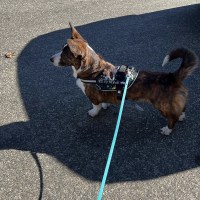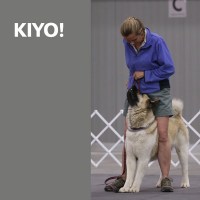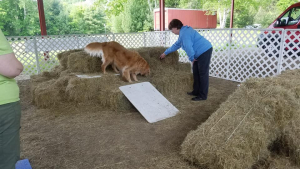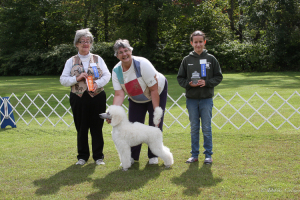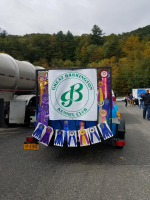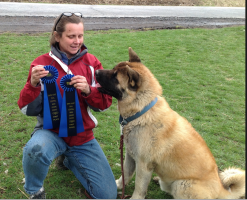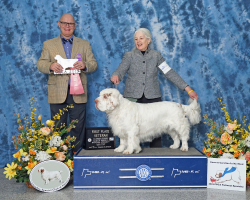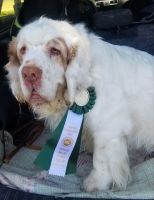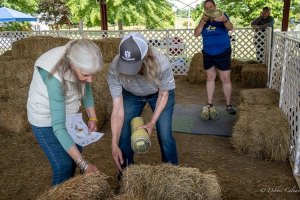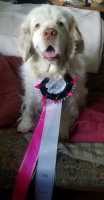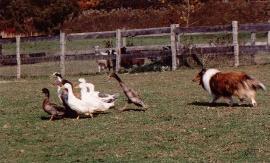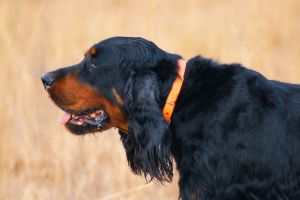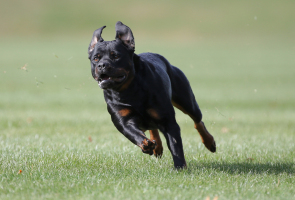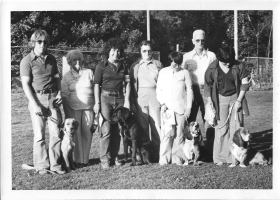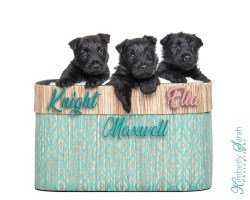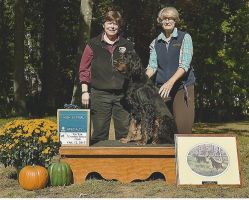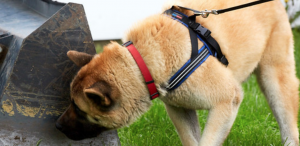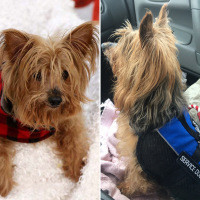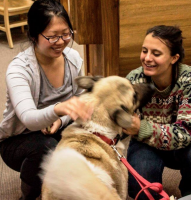Agility is a growing dog sport in the United States, with over 1 million entries to the AKC’s program each year. Dogs race against a clock as they navigate an obstacle course with strong concentration and speed. Agility is an AKC Companion event that is open to all dogs, whether purebred or mixed breed.
1 Photos
Canine Ambassadors contribute to their clubs’ and/or AKC’s public education efforts by making presentations to groups of children in classrooms or other venues. Canine Ambassadors bring their AKC- registered, PAL or AKC Canine Partner dog to the presentation. Ambassador dogs are comfortable in and around large groups of both adults and children of all ages.
2 Photos
Barn Hunt is the new and quickly growing dog sport catching fire across the country! Barn Hunt is based on the traditional roles of many breeds in ridding farms, barns, crop storage areas, and homes of destructive vermin. Some breeds were specifically created to fill this role, and for many of those breeds, Barn Hunt provides their first true opportunity for responsible breeders to test proper working traits in their dogs. Barn Hunt is also open to any dog of any breed or mix who wishes to play the game and can fit through an 18" wide by a bale-height tall tunnel. Barn Hunt has titles, levels of increasing difficulty, and championships. Barn Hunt is an independent sport, but titles are recognized by the American Kennel Club (AKC), the United Kennel Club (UKC), and the Canadian Kennel Club (CKC). You can get your Barn Hunt title recognized, by AKC/UKC/CKC. Barn Hunt is committed to creating a safe and fun sport for dogs, that also holds rat care at the highest level of consideration. The rats used in Barn Hunt are beloved family pets. They jump eagerly into their safe, comfortable aerated tubes and truly enjoy interacting with the dogs. It is a great sport for older dogs, and older people too! Tripod dogs can compete, and so can deaf dogs. To get started first read the rules. You can find events on the Barn Hunt website (barnhunt.com) event calendar.
28 Photos
The Canine Good Citizen™ (CGC) program is a two-part course designed to help you and your dog in mastering ten basic skills that instill confidence and good manners in and out of your home. Not only does CGC training create long-lasting trust between you and your dog, but also ensures you’ll be good neighbors and friends to everyone around you. The test is administered by an AKC CGC Approved Evaluator.
6 Photos
Great Barrington Kennel Club is involved in various community and dog-sport activities. GBKC dog/handler teams have earned titles and recognition for a variety of sports and activities. We are always looking for new and exciting ways to interact with our dogs and their people. GBKC members participate in Conformation, Scent Work/nose work, Barn Hunt, Hunting, SAR, FastCAT, Tracking, Lure Coursing, Trailing, Tricks, Obedience, Rally, and Herding, among others. We also demonstrate our commitment to community outreach by participating in parades and a variety of other community activities in which dogs can appropriately interact with the public. Several members are have certified Therapy Dogs who perform this valuable service in nursing homes, schools and also work with children. One of our member dogs even co-hosts her own Cable TV show (with her human, of course! Many member dogs are certified to have demonstrated good behavior in assorted situations bypassing their Canine Good Citizen, Farm Dog, Puppy class, and other socialization tests. GBKC donates money and equipment to various dog-related outreach programs both local and national organizations, as well as the Police K9 units.
16 Photos
Great Barrington Kennel Club members enjoy a variety of activities with their dogs – from the daily walks in the woods or sitting on the couch together to the more competitive sports. We love our dogs and are happy for any time we can spend with them.
Some of us also teach and/or judge various activities. One of our member dogs (and her human) even has a Community TV show!
19 Photos
On September 17, 1884, a group of twelve dedicated sportsmen, responding to a “meeting call” from Messrs. J. M. Taylor and Elliot Smith, met in the rooms of the Philadelphia Kennel Club in that city. Each member of the group was a representative or “delegate” from a dog club that had, in the recent past, held a benched dog show or had run field trials. This new “Club of Clubs” was, in fact, The American Kennel Club. This newly formed organization was created to ensure that dogs confirmed and excelled at the task they were bred for. 9 breeds were featured, most of whom were hunting breeds as that was the important task of the day - to exemplify "the qualifications and appearance of each breed." The official term for dog shows is conformation — as in, the act of conforming or producing conformity. While a dog show may look like a beauty pageant, it’s not. Dogs are not being compared to each other; they’re being measured by how closely they conform to the standard of their particular breed. Why? Because the closer a dog’s appearance is to the breed’s standard, the better that dog’s ability will be to produce puppies that meet the standard. It’s also the reason why mixed-breeds and spayed or neutered purebreds are ineligible to compete in conformation. The dog most closely conforming to the breed standard in the opinion of the judge will win Best of Breed.
45 Photos
Open to all breeds of dogs, this test involves your dog performing a series of 12 exercises that are typical for a farm environment such as being in close proximity to livestock (who are always penned to avoid any altercations); jumping and staying on hay/straw bales; walking on unusual terrain; and jumping over logs. There is no herding involved. Instead, the goal is to assess his aptitude as a working farm dog by exhibiting self-control, confidence and trust with you or his handler.
1 Photos
The Happy Ratter’s Philosophy – the goal is for the dog and owner to have a fun, positive, and successful experience while enhancing the bond between dog and owner, and placing a high priority on safety! Fun, trusting environment for dogs and their handlers to hunt vermin(rats) in “urban” settings. 1. A titling program that allows all dogs to compete toward different level titles. 2. A program that encourages camaraderie and support between competitors. The search for rats (safely contained in aerated and comfortable sturdy tubes) takes place in an “urban” setting: trash bags, boxes and barrels, and other items possibly found in a city alley, with the big difference being this is clean trash, new bags with shredded paper, clean boxes, etc. Happy Ratters features various fun games to add variety to the searches, all of which have titling opportunities that test the versatility of the teams' searching capabilities. New games are always on the horizon! Games include Dump Hunter (distance), Earn a Rat (handler control), Rats in the House, Infestation (2-6 rats), Ultimate Distance, Rat Trap (rat tubes galore!), Rapid Rat Relay (4 rats, rapid time), and Double Dutch (team game),
2 Photos
AKC’s Herding program offers both tests and trials. The herding test is offered in a non-competitive pass/fail format as an Instinct Test, Herding Test, and Pre-Trial test. All are conducted within a fenced arena and includes the use of livestock such as ducks, sheep, or cattle. During a test, a dog must demonstrate the ability to move and control livestock by fetching or driving and be sufficiently trained to work at the proper balance point to move the stock forward on the course. Herding Trials are competitive and dogs are scored on their herding abilities according to test level, course type, and livestock type. There are three test levels – started, intermediate, and advanced, and three courses to choose from: A, B, C, with each course type focusing on various aspects of herding work such as versatility, control, and movement of stock in an extended area, or tending to the flock in an unfenced area such as a road or in grazing flock management. Throughout all field trials the teamwork between handler/shepherd and dog is essential.
1 Photos
1) Pointing - There are three hunt test levels--Junior, Senior and Master--plus Advanced levels for dogs who have acquired a level but may want to compete further at the same level. Hunting tests are non-competitive pass/fail tests that assess each dog independently based on attributes such as display of desire, boldness, independence, speed with a useful pattern of running across difficult or confusing scent patterns to pinpoint the location of birds. J Other categories judges will score are: bird finding ability, pointing, trainability and, in Senior and Master tests – Retrieving and Honoring. The teamwork between dog and handler is essential.
2) Retrieving - Ever since the first AKC retriever hunting tests were held in 1985, the focus has been on how well your dog retrieves birds under all types of conditions. You don’t compete against other handlers and dogs; each dog is assessed based on his own merit (as opposed to competing in a Field Trial where a winner is chosen). There are three hunt test levels – Junior, Senior, Master, and titles can be earned at each level. Judges score dogs on their natural ability to mark and remember a fall, on their hunting style, perseverance or courage. They are also scored on learned abilities such as steadiness, control, response and delivery.
3) Flushing - When on the hunt for upland game of a feathered variety, a Spaniel breed is a good choice to accompany you. These friendly dogs come in a variety of sizes and were originally bred to flush out birds and waterfowl.
3 Photos
Lure Coursing
In this event, Sighthounds chase a mechanized, white plastic lure around a 600–800 yard course that simulates the unpredictability of chasing live prey, while helping to improve their focus, agility and sportsmanship.
CAT
One of the easiest ways to get involved in the world of dog sports is with a Coursing Ability Test (CAT). Designed specifically for newcomers, each dog chases after an artificial lure on either a 300- or 600-yard long course and must finish in less 1 ½ minutes and 2 minutes, respectively.
Fast CAT
Think of Fast CAT® – which stands for Coursing Ability Test – like measuring a track star’s speed: Dogs run individually in a timed 100-yard dash. Many different breeds participate in Fast CAT.
4 Photos
Developed in the 1930s, Obedience is one of the AKC’s oldest sporting events, and it’s open to all dogs. From walking on- and off-leash to retrieving and jumping, or demonstrating your dog’s ability to stay, Obedience trials feature dogs that are well-behaved at home, in public places, and in the presence of other dogs. It is essential that the obedience dog demonstrates willingness and enjoyment while it is working with the handler.
Whether or not you want to compete, every dog owner should consider some form of obedience training. It’s the best way to establish good communication skills between you and your dog – and to make sure that your dog is well-behaved in public and at home.
3 Photos
There's nothing quite like puppy breath to a dog lover! Having said that, our breeding members take this task very seriously. Compatible pedigree research is done before breeding is even considered. Parents are health-tested according to breed specifics, and dogs are carefully monitored as the puppies grow with the goal of producing the most sound and temperamentally correct dogs.
20 Photos
Rally is a team sport: You and your dog navigate a course, side-by-side, as you steer him through a course of 10-20 different signs. Each of these signs provides instructions regarding the next skill that is to be performed. The dog and handler move continuously throughout the course with the dog under control at the handler’s left side. There is a clear sense of teamwork between the dog and handler both during and between the numbered signs. Although each performance is timed, having a good race time is not the goal; it’s all about working as a team while performing the skills, with the dog under control.
Started in 2005, AKC Rally is a fun family sport and participation increases each year. All dogs are welcome to participate in AKC Rally, whether purebred or mixed breed. It’s a perfect starting point for those who are new to canine sports, as AKC Rally provides a challenging introduction to all AKC Companion Events for dogs and handlers to strengthen their skills.
3 Photos
AKC Scent Work is the country’s fastest growing dog sport. Scent Work competition was designed to mimic the serious task of working detection dogs to locate a scent and communicate to the handler that the scent has been found. Real-life detection dogs are trained to search for a variety of things–drugs, explosives, human remains, currency, other contraband,living humans (such as for Search and Rescue), and much more. AKC Scent Work takes this amazing working relationship and turns it into a fun game that any dog can play. AKC Scent Work is open to all dogs 6 months and older that are registered with the AKC, listed with the AKC Purebred Alternative Listing/Indefinite Listing Privilege (PAL/ILP), or the Canine Partners program. Scent Work is especially appealing as it is accessible to people and dogs of varying abilities, and fosters a bond between the dog and its human in a very special way. Newbies as well as serious competitors who want a “title at both ends”, showing the versatility of the dogs in their breeding program, are enthusiastically participating in these trials. These team-based activities are often therapeutic for rescue dogs and/or timid dogs who benefit greatly by this confidence-building activity. At a trial, teams of dog and handler search in a variety of classes at a variety of levels. Judging will usually begin at the Novice level each day and includes Interior, Exterior, Buried, and Container search. Levels of searching accomplishment run from Novice, Advanced, Excellent to Master, each level requiring 3 qualifying searches to attain. Teams may also earn Elite titles at any level by successfully qualifying 10 times. Overall titles at each level are also achievable,requiring 3 successful searches at the given level in each class. The targeted scents are Birch,Anise, Clove and Cypress. AKC Scent Work also offers Handler Discrimination where the dogs will search for an article containing the handler’s scent.
32 Photos
A service dog has been trained to perform specific tasks to aid a person with a disability. This often requires years of training to achieve the level of skill needed to assist his/her human. Under the ADA, an individual with a disability is a person who:
• Has a physical or mental impairment that substantially limits one or more major life activities;
• Has a record of such an impairment; or
• Is regarded as having such an impairment.
1 Photos
Since the 1980’s, there have been significant advances in the field of animal assisted therapy and the use of therapy dogs. Organized therapy dog groups provide educational material to volunteers, they screen both volunteers and dogs, and they provide liability insurance for when the dog and handler are volunteering in a therapy setting. Therapy dog certification organizations are the experts in this field. It is their dedication that has organized and advanced the work of therapy dogs and their efforts should be acknowledged and appreciated. The following certification organizations are recognized by the AKC. A dog must be certified by one of these organizations to be eligible to receive the AKC Therapy Dog title. The public should be aware that there are unauthorized organizations purporting to certify dogs as Therapy Dogs/Service Dogs/Emotional Support Dogs. Legitimately trained dogs have often spent years preparing to perform the tasks they are intended to do. AKC would like to thank the following national therapy dog registration/certification organizations for their assistance during the launching of the AKC Therapy Dog title: Alliance of Therapy Dogs (formerly Therapy Dogs, Inc.) Bright and Beautiful Therapy Dogs Love on a Leash Pet Partners (previously Delta Society) Therapy Dogs Incorporated (TD Inc.) – new name is Alliance of Therapy Dogs Therapy Dogs International
6 Photos
Tracking requires very little equipment. You just need a harness, a 20-to-40 foot lead, a few flags to mark your track, and an open grassy area free of obstacles such as roads, ditches, or woods. The Tracking Dog Test (TD) is a non-competitive test in which your dog follows a path to find article(s) dropped along the way. (Before you enter a Tracking Dog Test (TD), you must have the dog certified by an AKC-approved or provisional judge.) A dog earns a TD by following a track 440 to 500 yards long with three to five changes of direction. There’s no time limit as long as your dog is “working.” The dog is not allowed off lead at any time. The dog must follow the path the tracklayer has walked and find the article(s) dropped along the track. Judges follow the dog and handler to determine if the dog is on or off the track. If the dog follows the track and finds the article(s) placed on the track, he earns the tracking title for the level at which he is exhibiting.
8 Photos
There are five AKC Trick Titles you and your dog can earn: AKC Novice Trick Dog (TKN)- Your dog performs 10 skills from the Novice list. If a dog has a Canine Good Citizen (CGC) certificate or title on record at AKC, it can do 5 Novice tricks (CGC + 5) to earn the Novice title. These can include the following: Balance beam (walk on board a few inches off floor); Bark on cue (“Speak”); Crawl (dog on belly, crawls at least 3 body lengths); Fetch it (ball, etc., 10 ft. away, bring to handler within 2 ft); Find it (find treat or scent item hidden under 1 cup or object); Get your _______. (Leash, brush, name of toy); Get in (gets in box); Sits in box (on cue); Get on (gets on low platform or step - 4 paws); Hand signals (Choose one: down, sit, or come); High five; Hold (3 seconds); Jump (thru a low hoop or over a low bar); Kennel up (go in crate, stay in until released); Kiss (point to cheek or back of hand); Paws up (2 front paws on low stool or step); Push-ups (sit, down, sit, down, sit, down); Shake hands; Spin in circle; Touch it (hand or target stick); Tunnel (agility tunnel or child’s tunnel); or handler’s choice.
2 Photos

